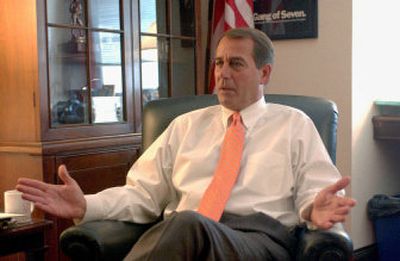GOP wants to rebrand itself

WASHINGTON – Their president’s approval ratings are at historic lows. The war in Iraq is grinding down their political prospects, and their party is showing deep divisions on issues such as education and immigration.
But to House Minority Leader John Boehner, R-Ohio, Republicans’ path to power rests on brand recognition. Boehner has convened a group of allies and confidants to work on GOP “branding,” an exercise designed to restore an identity to a party that many voters no longer see as holding a core set of principles.
“We’re trying to look into our conscience and define ourselves, and as we define ourselves, decide how we can best communicate that to the rest of the world,” said Rep. John Carter of Texas, the Republican conference secretary and one of the effort’s participants. “In other words, what are Republicans?”
To some House conservatives, the branding effort is navel-gazing in the middle of a hurricane. A Republican lobbyist familiar with the project, speaking on the condition of anonymity to maintain relations with GOP leaders, said it will be impossible to create a new Republican “brand” out of the House while President Bush casts his shadow and image on the party.
Critics see the whole exercise, for better or for worse, as a distillation of Boehner’s leadership style: feel-good consensus-building that eschews confrontation – but to little effect. Boehner is personally popular, they say, but with the party in such a deep hole, he needs to be more of a public leader.
“There’s a large and growing contingent in the conference that says he’s not being aggressive enough,” said one House Republican with close leadership ties, who spoke on the condition of anonymity to preserve those ties.
“He’s … agreeable. Everyone gets along. But that’s not the mind-set you need to get back to the majority.”
But Boehner’s defenders say the branding effort shows just how methodically he is going about winning back control of the House for the GOP. Former Speaker Newt Gingrich called the exercise “very Boehner-like,” in a positive way. While Gingrich took risks during his time as leader, he did not fault Boehner’s more subdued style.
“Nobody should underestimate that beneath his pleasantness, his controlled manner, his passion for golf, underneath that, there is a passionate competitor,” Gingrich said.
Boehner and his loose group of “branders” have their work cut out for them. A New York Times-CBS News poll last week found that 56 percent of voters held an unfavorable view of the GOP, compared with 42 percent who viewed Democrats negatively.
At six to eight meetings over the past four months, the branding group has met to hash over communications strategy and try to figure out how to restore the GOP’s image as the party of small government, freedom and personal responsibility, said Rep. Tom Price, R-Ga., one of the effort’s leaders.
Many Republicans say they are fine with the idea but they have no illusions about its prospects. Unless the party can unite behind a new set of policy initiatives, voters will have little reason to see the GOP brand as anything more than a slogan.
“Obviously we need to try to restore the image of the Republican Party; this quote-unquote branding is more a message thing,” said Rep. Thaddeus McCotter, R-Mich., who heads the House Republicans’ policymaking committee. “In the end, you can call yourself whatever you want, but your deeds have to match your words. We need ideas.”
House Republican morale has been buoyed in recent weeks by a series of parliamentary maneuvers that have gone their way.
A sustained GOP attack on Rep. John Murtha, D-Pa., chairman of the Appropriations subcommittee on defense, has yielded several days’ worth of media coverage on what Republicans have called Murtha’s heavy-handed tactics and his generosity with taxpayers’ money.
But beyond Washington, such small triumphs have had little political impact, some House GOP members and aides concede. On legislation, Republicans have at times shown remarkable disunity.
In the coming months, House Republicans will have to deal with domestic issues that divide the party deeply.
The House will take up legislation in July that couples border security with new avenues for illegal immigrants to stay and work in the country, and Bush will be pushing hard to round up Republican support.
Congress will also have to decide whether to extend Bush’s signature No Child Left Behind education law, a measure that Boehner helped craft but that is now castigated by many Republicans, including House Minority Whip Rep. Roy Blunt, R-Mo.
With more difficult issues on the horizon, he will be under increasing pressure to take tough stands – and to demand that his party follow him.
“I would hope Leader Boehner lets his voice be heard loud and clear,” said Rep. Jeb Hensarling of Texas, who heads the conservative Republican Study Committee.